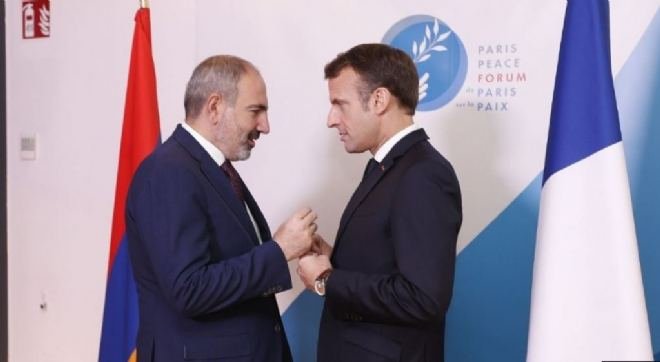

BAKU, Azerbaijan, February 24. Following the second Karabakh war between Armenia and Azerbaijan, the realities in the South Caucasus have changed, and this did not go unnoticed in the West, in particular, in France. Since the end of the war, the relations between Azerbaijan and France could be called a roller coaster, yet it never escalated to anything extremely serious.
For two years now, French officials have been voicing their support for Armenia, and, sadly, this trend still continues. The visit of the former Prime Minister of France, Édouard Philippe (currently major of Le Havre), to Armenia, is the latest occurrence.
No surprises here, as Philippe went for the usual anti-Azerbaijani tirade, a lot of bold, yet weightless statements. While the visit itself was not a major event, the tendencies demonstrated by the visit were very significant with far-reaching consequences.
Maximize own benefits at the expense of others - a recurring theme in French foreign policy, and we already talked about it in detail. The destructive impact of such strategy is affecting the EU's long-term policy in at least two major directions.
Direction one: the EU's effort to mediate between Armenia and Azerbaijan
It is no surprise that Baku finds it challenging to accept the position of France, within the context of Azerbaijan-Armenia relations. Previously, France initiated several steps, including trying to push an openly anti-Azerbaijani resolution, which was consequently shut down. The openly hostile attitude of France led to a situation where Baku became disenchanted with the prospect of having France as a mediator and refused to participate in the France-mediated talks in December 2022.
Fast-forward to the latest Munich Conference, where President of Azerbaijan Ilham Aliyev reconfirmed Azerbaijan’s commitment to the Brussels peace talks format. This gave renewed hope that the Brussels platform keeps functioning and, possibly, the process would go smoother. And just a few days after that, Édouard Philippe made his controversial visit to Armenia. Not so smooth after all, but Azerbaijan keeps its hopes high.
Direction two: EU's energy security at risk
In mid-2022, the Coordinating Council of Armenian Organizations of France, in agreement with 61 political leaders in France, issued a call to the European Commission President Ursula von der Leyen to suspend the gas talks with Azerbaijan, under the pretense of the argument that the deal will make the EU weaker. The rationale for such claims is a bit dubious, considering the limited availability of reliable gas exporters, geopolitical problems, and low gas reserves.
The interesting part here is that France has a lower level of dependence on gas, compared to other European countries, due to the wide adoption of nuclear energy. France satisfies around 70 percent of its energy demands through nuclear energy, thanks to its strategy known as the Messmer plan, which intended to develop nuclear energy expertise and secure the energy independence of France. Due to the lack of impact of the Azerbaijan-EU gas deal on their country, some French politicians "went nuclear" on the European Commission President, who acted in the best interests of all member states.
France-EU conflict of interests: final thoughts
France remains an important part of the EU and this is unlikely to change, therefore Paris will impact the EU policies. However, there is a certain conflict of interest involved. French realpolitik leads to the interests of the EU being jeopardized. In the context of the Brussels Armenia-Azerbaijan peace negotiations format, the open support demonstrated by French politicians of different ranks, including the president, creates major challenges for the EU.
One is undermining the credibility of the EU as a value driven mediator. Brussels has limited tools at its disposal to mediate, also it is unable to enforce peace militarily, sanction a country without solid legal grounds, and openly disregard international law. When French officials try to sway the opinion of decision makers in Brussels, they strip the EU of the single mediation tool available.
Another challenge is the French position regarding the peace talks between Armenia and Azerbaijan, and France's "desire" to assist Armenia, just for the sake of doing so. After all, if France really wanted the prosperity of Armenia, it would have created all the necessary conditions for Armenia to engage with Azerbaijan, thus fostering peace between the nations. This is not what is happening - France pursues its own goals, at the expense of the EU, and the bloc will find it incredibly hard to mediate in existing circumstances.
Different energy-related priorities push some French politicians see the talks between Azerbaijan and the EU as an opportunity to extend their influence with minimal risks for their country.
The support of French politicians to Armenia is a problem for the EU. The difference of needs for France and the EU is too significant and apparent in the context of the relationship with Azerbaijan. So, the EU decision-makers have to ensure that any policy approach takes into consideration the interests of the Union as a whole and not the desires of a single country.